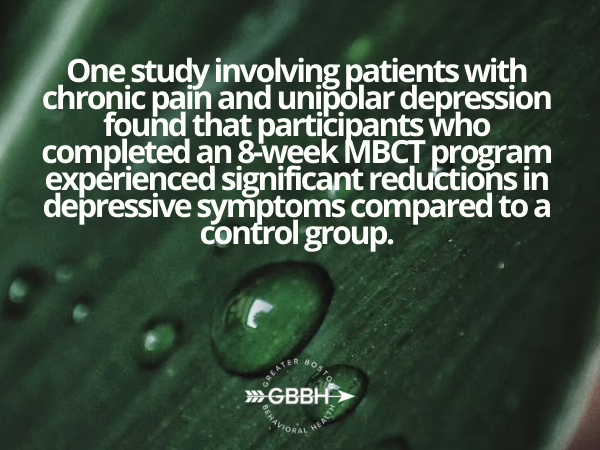The relentless bustle of city life in Boston, MA, can be a double-edged sword. One moment, you’re invigorated by the energy and opportunity that pulsates through its streets. Next, you find yourself swept under a wave of stress, anxiety, and a relentless inner critic. Negative thoughts become a nagging soundtrack, impacting your mood, relationships, and ability to savor the vibrant life around you.
If you’re looking for a powerful tool to quiet the mental storm and cultivate inner peace, Mindfulness-Based Cognitive Therapy (MBCT) might be the answer you’ve been seeking. MBCT is an evidence-based approach gaining significant popularity in Boston for its effectiveness in addressing the very issues that can plague city dwellers – stress, anxiety, and the grip of negative thinking patterns.
But what exactly is MBCT, and how can it help you navigate the complexities of modern life in Boston?
A Unique Blend of Techniques
MBCT combines two powerful therapeutic approaches: mindfulness meditation and cognitive behavioral therapy (CBT).
MBCT is a unique therapeutic approach that blends the ancient practice of mindfulness meditation with the well-established techniques of cognitive behavioral therapy (CBT). Imagine this: mindfulness meditation equips you with the ability to step back from the daily chaos and observe your thoughts and feelings with a sense of detached awareness. It’s like taking a balcony seat in the theater of your own mind, allowing you to witness the play of thoughts and emotions without getting swept up in the drama.
How it works
Through guided meditations and gentle exercises, you learn to focus your attention on the present moment – the sound of your breath, the physical sensations in your body, the sights and sounds around you. This cultivation of present-moment awareness allows you to detach from the endless loop of negative thoughts and gain a clearer understanding of your internal world.
On the other hand, CBT equips you with the tools to address those negative thought patterns once you’ve become aware of them. CBT therapists help you identify distorted thinking styles, also known as cognitive distortions. These are the mental filters through which we often interpret situations in an unhelpful way. For example, you might catastrophize a minor setback, believing it’s a sign of impending failure. Through CBT techniques, you learn to challenge these distortions and develop more balanced and realistic perspectives.
By combining these seemingly disparate approaches, MBCT empowers you to:
- Respond, Not React: Mindfulness helps you become aware of your thoughts and emotions before they trigger automatic reactions. Imagine yourself feeling a surge of anger. With mindfulness, you notice the physical sensations of anger arising in your body, the tightening in your chest, the clenching of your jaw. This awareness gives you a precious window of opportunity to choose your response rather than letting anger dictate your behavior.
- Break Free from Negativity: Through mindfulness meditation, you learn to identify and de-identify with negative thought patterns. You begin to see them as mental events passing through your awareness, rather than absolute truths. This allows you to detach from their power and prevent them from controlling your behavior.
- Develop Emotional Resilience: Life in Boston, like anywhere else, throws its fair share of curveballs. MBCT equips you with tools to manage difficult emotions in a healthy way. You learn to observe and accept your emotions without judgment, and develop coping mechanisms to navigate challenging situations with greater equanimity.
- Increase Focus and Concentration: The constant stimulation of city life can make it difficult to focus. Mindfulness practices, with their emphasis on present-moment awareness, enhance your ability to direct your attention and reduce distractions. Imagine yourself trying to work on a project at a bustling cafe. With mindfulness skills, you can train your attention to stay focused on the task at hand, even amidst the surrounding noise and activity.
These are just some of the ways MBCT can empower you to navigate the complexities of modern life and cultivate a sense of inner peace, even in the heart of a vibrant city like Boston.
The Benefits of Mindfulness-Based Cognitive Therapy
MBCT isn’t a quick fix or a magic bullet. It’s a journey of self-discovery and transformation, a commitment to cultivating a more mindful and present way of being. Research conducted over the past few decades has yielded a wealth of evidence highlighting the numerous benefits associated with regular MBCT practice. Here are some of the ways MBCT can positively impact your life:
Reduced Symptoms of Stress, Anxiety, and Depression
The constant pressure to achieve and keep up with the fast pace of city life can take a toll on your mental health. MBCT has been shown to be effective in reducing symptoms of stress, anxiety, and depression. By developing a more mindful awareness of your thoughts and emotions, you can learn to manage them in a healthier way.
Improved Emotional Regulation
Difficult emotions are a natural part of life, but they can be overwhelming if you don’t have the tools to manage them effectively. MBCT equips you with skills to identify your emotions, understand their triggers, and develop healthy coping mechanisms. Imagine feeling overwhelmed by frustration. With MBCT skills, you can learn to take a mindful breath, acknowledge your frustration without judgment, and choose a constructive response rather than letting your emotions dictate your actions.
Increased Self-Awareness and Self-Compassion
The constant busyness of city life can make it easy to lose touch with your inner world. MBCT cultivates a sense of self-awareness, allowing you to better understand your thoughts, feelings, and motivations. This deeper understanding fosters self-compassion – the ability to treat yourself with kindness and understanding, especially during challenging times.
Enhanced Focus and Concentration
The digital age bombards us with information and distractions. MBCT practices, with their emphasis on present-moment awareness, can significantly improve your ability to focus and concentrate. You’ll find yourself less easily pulled away by external stimuli and better able to direct your attention to the task at hand.
Greater Ability to Manage Chronic Pain
For those living with chronic pain, the constant discomfort can take a significant toll on mental well-being. Studies have shown that MBCT can be a valuable tool in managing chronic pain. By cultivating mindfulness, individuals learn to observe and accept pain sensations without judgment, leading to a reduction in the emotional distress associated with chronic pain.
Improved Sleep Quality
Stress and anxiety can wreak havoc on your sleep patterns. The relaxation techniques and improved emotional regulation skills fostered by MBCT can lead to better sleep quality. Imagine finally drifting off to sleep without the worries of the day swirling in your mind.
Who Can Benefit from MBCT?
The beauty of MBCT lies in its versatility. It’s a program that can benefit a wide range of individuals. Whether you’re struggling with:
- Anxiety disorders
- Depression
- Chronic stress
- Negative thought patterns
- Difficulties managing difficult emotions
- Chronic pain
- Sleep issues
or simply seeking to enhance your emotional well-being and build resilience in the face of life’s challenges, MBCT can be a valuable tool in your mental health toolbox.
Explore Cognitive Therapy for Addiction Treatment at Greater Boston Behavioral Health
While MBCT is a powerful tool for managing stress, anxiety, and negative thinking patterns, it may not be suitable for everyone. For individuals struggling with co-occurring mental health and substance use disorders, known as dual diagnosis, a more comprehensive treatment approach might be necessary.
Greater Boston Behavioral Health is a leading mental health treatment center in, Needham, Boston that offers a variety of evidence-based treatment programs, including cognitive-behavioral therapy for addiction treatment. Cognitive therapy equips individuals with tools to identify and challenge negative thought patterns that contribute to both mental health and substance use issues.
Here are some of the benefits of seeking treatment at Greater Boston Behavioral Health:
- Experienced Therapists: Their team comprises licensed and experienced therapists specializing in treating dual diagnosis.
- Integrated Treatment Approach: They offer a holistic approach that addresses both the mental health and substance use aspects of dual diagnosis.
- Individualized Treatment Plans: Treatment plans are tailored to meet the unique needs of each client.
- Supportive Environment: Greater Boston Behavioral Health provides a safe and supportive environment for healing and recovery.
If you’re unsure whether MBCT is the right fit for you, or if you’re facing the challenges of dual diagnosis, consider exploring the comprehensive addiction treatment options available at Greater Boston Behavioral Health.
Conclusion
The constant hum of city life can be both energizing and overwhelming. MBCT offers a powerful tool to navigate the complexities of modern life in Boston, MA. By cultivating mindfulness and developing healthy coping mechanisms, you can find inner peace and build resilience in the face of daily challenges. Remember, you are not alone on this journey. GBBH reputable MBCT programs and resources available to support you. Call us at (888)278-0716 today to learn more about our services and how we can help you on your journey to recovery!
FAQ on MBCT in Boston, Massachusetts
What is MBCT and how does it work?
MBCT stands for Mindfulness-Based Cognitive Therapy. It combines mindfulness meditation practices with techniques from cognitive behavioral therapy (CBT). Through meditation, you learn to observe your thoughts and feelings without judgment. CBT helps you identify and challenge negative thinking patterns.
What are the benefits of MBCT?
MBCT can help reduce stress, anxiety, and depression symptoms. It can also improve emotional regulation, self-awareness, focus, and sleep quality. Some studies suggest it may even be helpful in managing chronic pain.
Who can benefit from MBCT?
MBCT can benefit a wide range of individuals struggling with anxiety, depression, stress, negative thought patterns, or difficulty managing emotions. It can also be helpful for those seeking to enhance their overall well-being and build resilience.
Is MBCT right for me?
If you’re struggling with stress, anxiety, or negative thinking patterns, MBCT could be a valuable tool. However, for individuals with co-occurring mental health and substance use disorders (dual diagnosis), a more comprehensive treatment approach might be necessary.
What if I need treatment for dual diagnosis?
Greater Boston Behavioral Health offers cognitive therapy programs specifically designed for dual diagnosis. Their team of experienced therapists utilizes evidence-based approaches to address both the mental health and substance use aspects of this condition.
I’m ready to take the next step. What should I do?
If you’re interested in exploring MBCT programs in Boston, contact GBBH programs directly to inquire about their offerings. If you suspect you might need treatment for dual diagnosis, consider reaching out to Greater Boston Behavioral Health for a consultation. Remember, there is help available, and you don’t have to navigate these challenges alone.


